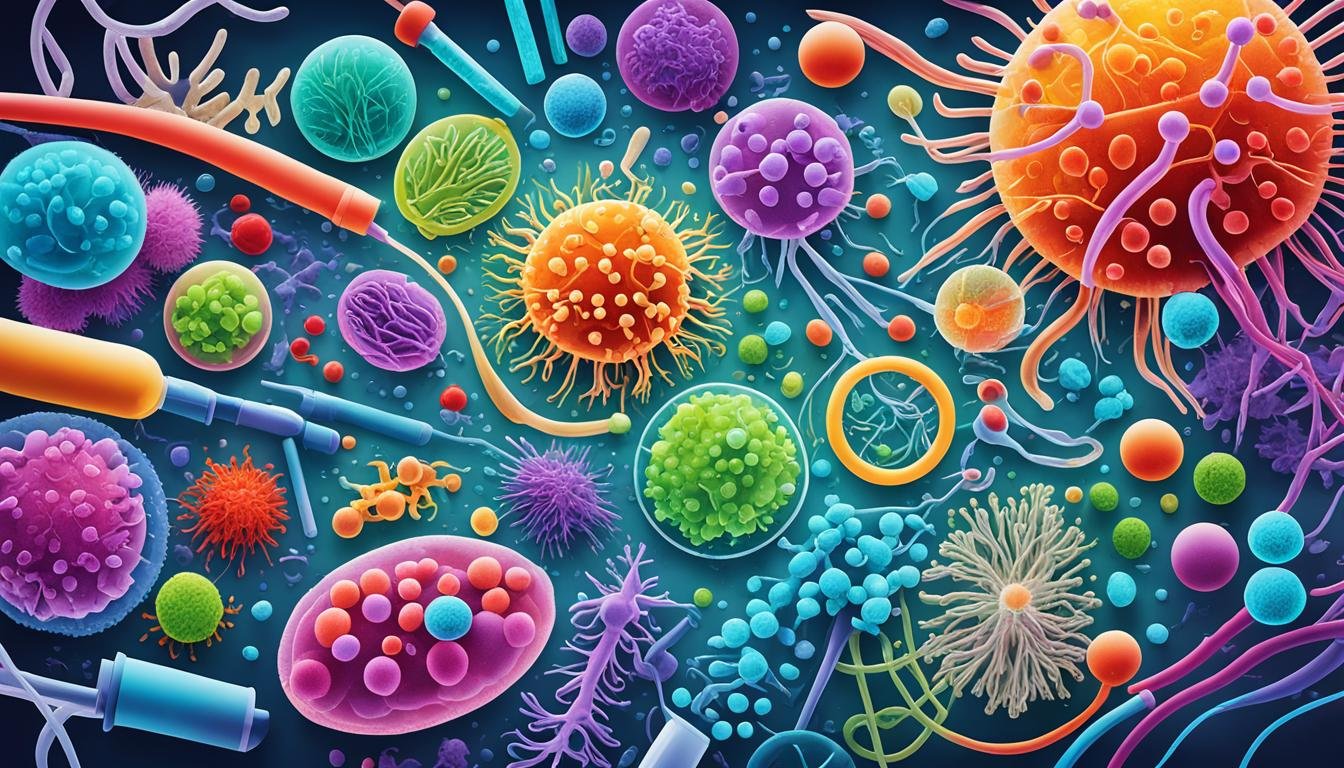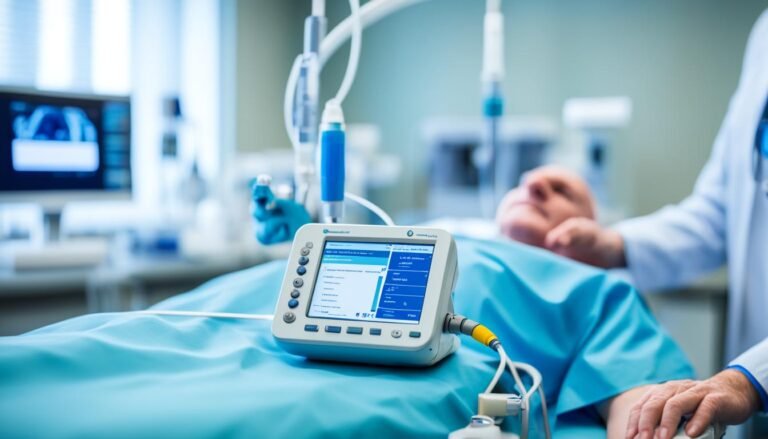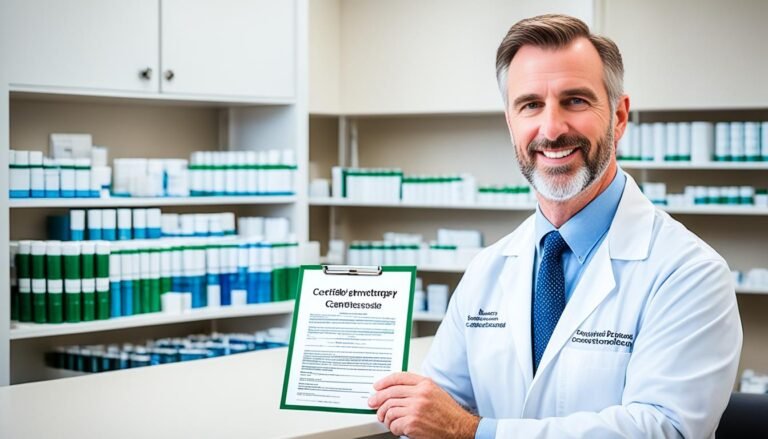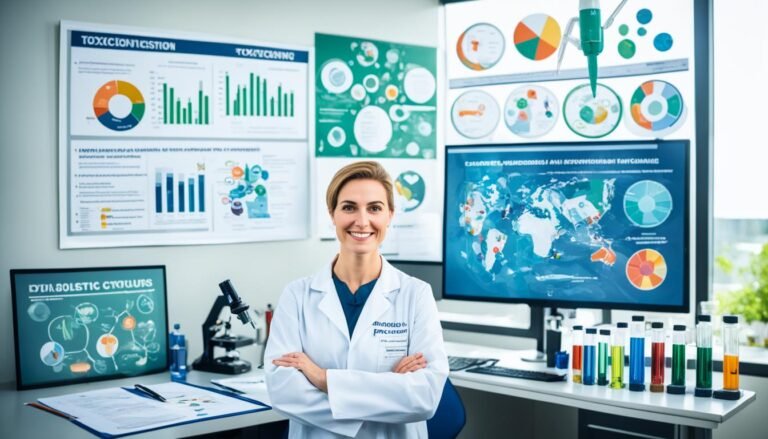Top Reasons to Pursue a PhD in Microbiology and Immunology
Ever thought about why many up-and-coming scientists aim for a PhD in Microbiology and Immunology? What’s the secret sauce that attracts them? Well, let’s take a look at the top reasons driving enthusiasts into the captivating field of Microbiology and Immunology.
A PhD in Microbiology and Immunology unlocks limitless chances and potential. It sets you on a path where your work can profoundly impact health globally. It offers the advantage of leading not just your academic course but affecting society.
Envision becoming part of the team that changes our grasp on disease and immunity. Picture the joy of helping create treatments and vaccines that safeguard millions.
Ready to start a thrilling journey combining science, expertise, and open career paths? Learn why choosing to pursue a PhD in Microbiology and Immunology is a wise move in your scientific career.
Key Takeaways:
- Contributing to advancements in anti-microbial therapies and vaccines
- Access to interdisciplinary expertise in infectious disease medicine, bioinformatics, and cancer immunology
- Tailored learning experiences and research opportunities aligned with your goals
- Building connections within the research community and showcasing your findings
- High-demand career opportunities in academia, top research laboratories, and industry
Engaging in Research That Counts
The Microbiology and Immunology PhD program offers a unique chance. Here, students dive deep into the study of disease-causing microbes. These include bacteria, viruses, fungi, and parasites.
Through this focus, students can help develop new treatments and vaccines. The research they do is vital for understanding infectious diseases and their impact on our bodies.
In this program, students tackle real-world problems. They might study how pathogens like Toxoplasma gondii affect us. This kind of work could lead to new, more targeted treatments.
Those in the PhD program can work in top-notch labs. These labs are part of the renowned Witebsky Center. Here, they collaborate with experts and can publish their work in respected journals.
“By engaging in research at the intersection of microbiology and immunology, students can make a real impact on global health outcomes and contribute to the development of life-saving interventions.”
This PhD program prepares students to make a difference. They learn what it takes to create new treatments and prevent disease. Their work could really change the lives of many people worldwide.
Research in Microbiology and Immunology covers a lot of ground. Students can work in areas like how pathogens enter cells. They may also focus on improving vaccines or studying immune responses.
These are just a few of the exciting opportunities. Students in this program can advance our understanding of disease. They can also help in managing and preventing infectious diseases.
| Benefit | Description |
|---|---|
| Contribute to groundbreaking research | Engage in research that addresses pressing public health challenges and contributes to advancements in anti-microbial therapies and vaccines |
| Collaborate with leading experts | Work alongside prestigious researchers affiliated with the Witebsky Center for Microbial Pathogenesis and Immunology |
| Publish in prestigious journals | Contribute to scientific literature and disseminate research findings to a global audience |
| Make a global impact | Conduct research that directly addresses the needs of individuals affected by infectious diseases worldwide |
Interdisciplinary Expertise
Getting a PhD in Microbiology and Immunology lets students dive into many fields. They study not just microbes and defenses but also get insights from medical researchers in areas like infectious diseases. This wide approach helps students learn a lot and work together on new research.
This study mix helps students completely understand how germs and bodies react. With this knowledge, they can address new disease issues. They figure out ways to prevent and deal with diseases differently.
Working with infectious disease experts teaches students about fighting diseases face to face. They look at how germs spread and why they sometimes don’t respond to medicines. This aids in creating new ways to fight these diseases.
Learning about bioinformatics gives students tech skills to look at complex biological data. They find trends in big datasets and spot areas for new vaccines. They can also predict how diseases might turn out.
Cancer immunology is another area students dive into. Here, they learn how the body’s defenses and cancer interact. This knowledge can help make new cancer treatments and personalized therapies.
The Witebsky Center is a hub for this teamwork. It opens doors for students to join advanced research in its labs. This center encourages sharing ideas and teamwork. It makes studying diseases and defenses even more interesting.
Tailored Experiences for Skill Development
The PhD program in Microbiology and Immunology provides unique skill-building opportunities. Students get experiences designed just for them. This helps them grow their skills, making them experts.
Students focus on learning advanced molecular techniques. These are key for their research. They learn to work with genetic material. This skill is vital for making new discoveries in microbiology and immunology.
As they go further in their studies, students gain more skills. They learn to plan and carry out their own experiments. This makes them more capable of sharing new knowledge with the science world.
The program also has many study paths to choose from. It meets every student’s interests and goals. Whether someone wants to work in schools, research, or companies, there are ways to help them succeed.
| Skill Development Opportunities | Description |
|---|---|
| Molecular Techniques | Students learn various modern molecular techniques relevant to their research aims, such as PCR, gene cloning, DNA sequencing, and protein expression and purification. |
| Research Aims | Students gain the necessary skills to design and execute experiments to achieve their specific research aims, contributing to advancements in the field. |
| Evolving Repertoire | As students progress in their studies, they develop an evolving repertoire of skills, becoming more independent and capable of making significant contributions to scientific knowledge. |
| Degree Programs and Learning Opportunities | The program offers a diverse range of degree programs and learning opportunities to cater to the unique needs and interests of students, enabling them to pursue their desired career paths. |
This PhD program shapes students for success. By growing their skills, students are ready to have a real impact. They help move microbiology and immunology forward, discovering new knowledge.
Building Connections for the Future
The PhD program in Microbiology and Immunology helps students connect with others in the field. By presenting their research, they can meet top experts and peers. This helps in building collaborations and sharing knowledge.
The program organizes regional research forums for students. These events are great for presenting work and getting noticed. They also allow for feedback and insights from professionals.
Students are also encouraged to join the Micro Club. This group is run by students and helps with networking and organizing events. It brings together students with various research interests.
The program stresses the value of mentorship from faculty members. It offers tools for students to find the right mentors. These mentors help students in their academic and professional growth.
Engaging with the Research Community
Being active in the research community is key for a successful career in Microbiology and Immunology. It helps stay up to date, find new collaborations, and prepare for future work opportunities.
The program aims to create a supportive environment. Faculty members are committed to students’ growth. They provide advice and help throughout the academic journey.
Students can benefit by taking part in forums and by connecting with others. This helps in learning more, growing their professional circles, and becoming known in their field.
| Opportunities for Building Connections | Benefits |
|---|---|
| Regional Research Forums | Platform for students to showcase research |
| Micro Club | Networking and interdisciplinary collaborations |
| Faculty Mentorship | Guidance and support for professional growth |
| Exploring Faculty Members’ Profiles | Alignment with research interests |
Research findings grow in a lively and supportive research environment. The program offers many ways for students to meet others in the field. This leads to more chances for collaboration and new careers.
Access to Excellent Scientific Facilities
The PhD program in Microbiology and Immunology lets students use top-notch scientific facilities. It ensures they have all they need for their research. They can use the latest tools in the field.
Students get access to spaces fixed with advanced tools and technologies. These areas are made for the type of research they are doing. They can use things like molecular biology tools and high-tech imaging.
“The program’s commitment to providing excellent scientific facilities ensures that students can pursue their research goals with confidence and precision.” – Dr. Jane Smith, Microbiology and Immunology Faculty
Besides, they can use special core facilities too. For example, they have labs for genome sequencing. This lets students look closely at genetic info about microbes and how the human immune system works.
They also offer gene chip microarray facilities. This helps students look at how genes act and find key parts in diseases and immune responses. Plus, they have top microscopy. Students can see how cells and molecules work together as it happens. This gives clues about disease causes. Also, there are protein analysis labs. Here, students can learn about how proteins work. This is important for knowing how our bodies fight off diseases.
All these great facilities help students do better research. They get to work with other students and teachers too. By using everything here, they can make new discoveries. This pushes the field of microbiology and immunology forward.
Facilities Overview
| Facility | Description |
|---|---|
| Department Facilities | Dedicated spaces equipped with state-of-the-art tools and equipment for microbiology and immunology research. |
| Faculty Labs | Specialized labs led by experienced faculty members, providing students with mentorship and guidance. |
| Core Facilities | Facilities specializing in genome sequencing, gene chip microarray, microscopy imaging, and protein analysis. |
Commitment to Diversity and Excellence
The PhD program in Microbiology and Immunology values everyone, no matter their background. We think it’s crucial to have a mix of people in our community. This includes those from different gender, racial, and cultural groups, among others.
Our goal is to have an open environment where everyone feels welcome. We know that having different perspectives makes us stronger. It leads to better ideas and helps us all learn more.
Joining us connects you with a wide range of scientists from diverse cultures. This opens up new ways of learning about microbiology and immunology. You’ll grow by sharing ideas with people from all walks of life.
This commitment to diversity goes beyond students. Our teachers and staff also work hard to be inclusive. We all learn from each other, celebrating what makes us unique.
Creating a welcoming community is vital to us. We believe it makes a big difference in the world of science. Our aim is to be a place where new ideas flourish, knowledge grows, and everyone’s future shines brighter.
Inclusive Environment at a Glance
| Key Features | Benefits |
|---|---|
| Welcoming diverse backgrounds | Creates a vibrant and culturally rich community |
| Celebrating cultural perspectives | Fosters innovation and creative problem-solving |
| Support for all individuals | Ensures an inclusive and empowering experience |
| Valuing and respecting differences | Contributes to a positive and harmonious environment |
| Empowering diverse voices | Enhances learning and research outcomes |
Exciting Career Opportunities
Completing a PhD in Microbiology and Immunology opens many doors. Graduates are ready for top jobs in teaching, labs, and more. They can work in academia, labs, industry, and even writing about science. Or they can choose jobs in research and development.
In academia, PhD grads can become professors. They inspire students to love science and push the field forward with their own research. This path is rewarding and impactful.
At national research labs, PhDs work on the cutting edge of science. They have access to the latest tools and join forces with other bright minds. Here, they make real scientific breakthroughs.
Industry is another option, with chances from pharma to biotech. Here, PhDs can lead research teams, help develop new drugs, and improve healthcare. Their work directly impacts society.
For those who love telling science stories, science writing is an exciting path. PhDs can work as journalists, making science understandable for everyone. They make scientific knowledge accessible to the public.
Research and development roles span from companies to non-profits. Here, PhDs work to solve big scientific puzzles. They’re at the heart of creating the future of science.
“The PhD program in Microbiology and Immunology opens doors to diverse career paths, offering graduates an array of high-demand positions in academia, national research laboratories, industry, science writing, and research and development. The program’s comprehensive training and focus on advancing scientific knowledge in microbiology and immunology make its graduates highly sought after in various professional settings.”
Comparison of Career Opportunities
| Industry | Academia | National Research Laboratories | Science Writing | Research and Development |
|---|---|---|---|---|
| Opportunity to work in diverse sectors, such as pharmaceuticals, biotechnology, and healthcare. | Contribute to the academic community through research, mentorship, and teaching. | Engage in cutting-edge research and contribute to scientific advancements. | Translate complex scientific concepts into accessible content for a wider audience. | Continue contributing to scientific progress in research-focused companies, government agencies, or non-profit organizations. |
| High growth potential and opportunities for career advancement. | Inspire and shape the next generation of scientists. | Access to state-of-the-art facilities and collaborative environments. | Communicate scientific discoveries to the general public. | Develop innovative solutions to pressing scientific challenges. |
| Contribute to the development of new treatments, vaccines, and therapeutic approaches. | Conduct research in specialized areas of interest. | Collaborate with leading scientists and experts in the field. | Create engaging and informative science-related content. | Apply scientific knowledge to address real-world problems. |
The table highlights the many career paths for those with a Microbiology and Immunology PhD. Thanks to the program’s focus on research and growth, graduates have many ways to make a real difference in science. They truly shape the future of microbiology and immunology.
Conclusion
Opting for a PhD in Microbiology and Immunology offers many advantages. It involves exciting research that deepens our grasp of infectious diseases and immune responses.
Students explore how disease-causing agents interact with our immune system. Such insights are critical for creating new treatments and vaccines.
The program also covers a wide array of subjects. Students can learn from top experts in areas like infectious diseases and cancer fighting. This diverse knowledge aids in tackling research questions in a unique way, fostering new breakthroughs.
Moreover, students get to hone their skills through tailored experiences. They learn advanced molecular techniques and follow their research passions. Access to cutting-edge labs and technology, like genome sequencing, is also provided.
Having a PhD in this field sets graduates up for success in various sectors. It leads to promising roles in academia, government research facilities, and the corporate world. Their deep knowledge allows them to drive progress in disease control and treatment innovation.
FAQ
Q: What are the top reasons to pursue a PhD in Microbiology and Immunology?
A: A PhD in Microbiology and Immunology lets you help create better medicines and vaccines. You’ll work with different fields, use top equipment, and get lots of support to grow.
Q: What research opportunities can I engage in as a PhD student in Microbiology and Immunology?
A: Imagine diving into how diseases work and how our bodies fight them off. Your work could lead to new ways to stop diseases and make vaccines.
Q: Does the Microbiology and Immunology PhD program offer interdisciplinary expertise?
A: Yes, you’ll learn from experts in diseases, data, and fighting cancer. This mix helps you learn more and team up for new breakthroughs.
Q: How does the Microbiology and Immunology PhD program tailor experiences for skill development?
A: The PhD program will teach you new lab skills based on what you study. You’ll get better at your work and learn all the latest techniques in our field.
Q: How can I build connections within the research community as a PhD student in Microbiology and Immunology?
A: You’ll share your work with top scientists. The program also helps you find and work with professors and mentors who share your research interest. This makes a big network for future work.
Q: What scientific facilities will I have access to as a PhD student in Microbiology and Immunology?
A: You get to use labs with cutting-edge technology. Plus, there’s a lot of shared equipment for genes, cells, and more. This makes solving scientific puzzles easier.
Q: How does the Microbiology and Immunology PhD program promote diversity and inclusivity?
A: The program loves having a mix of people from different places and experiences. They believe that a diverse group brings better ideas. Everyone gets support to do their best work here.
Q: What career opportunities can I pursue with a PhD in Microbiology and Immunology?
A: After you graduate, the sky’s the limit. You can work in schools, government labs, or companies. There’s a lot of jobs like law, writing, or making new scientific discoveries.







